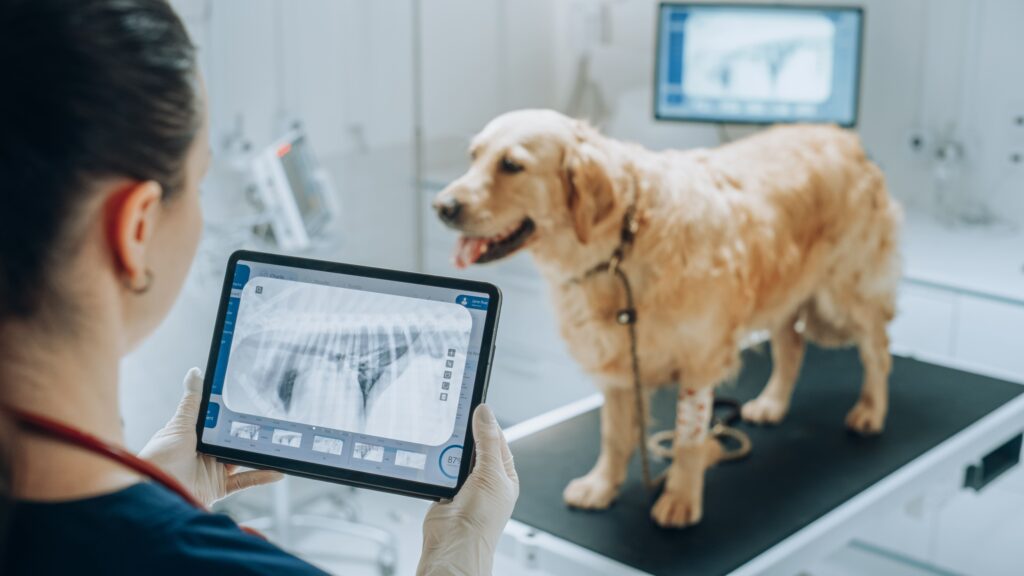Help, My Pet Broke a Bone!

At Trail Pet Hospital, we understand how distressing it can be when your precious pet is injured or has a broken bone. We are pleased to offer state-of-the-art technology and cutting-edge fracture repair techniques to promote healing, restore mobility, and enhance your pet’s quality of life. You can always count on us for quality, compassionate care!
What Are the Causes of Bone Fractures in Pets?
The most common causes of pet bone fractures include accidents and trauma due to collisions, car accidents, falls, or other traumatic incidents. High-impact activities like rough playing or jumping can also lead to bone fractures, especially in smaller animals or more fragile breeds.
Aside from trauma, age-related conditions like osteoporosis or degenerative joint disease can leave your pet more prone to fractures. This is also the case with metabolic disorders that weaken the bone or diseases, infections, tumors, or genetic disorders that affect a pet’s bone strength.
What Are the Types of Fractures?
There are two main types of fractures: incomplete and complete. Incomplete fractures are common in young animals and usually involve a bone that’s partially broken. Complete fractures, on the other hand, are more serious, involving the bone being broken into two or more fragments.
Recognizing the Symptoms of Bone Fractures
The symptoms of bone fractures in pets can vary depending on the severity of the injury and the location of the fracture. Watch for signs like limping, lameness, swelling, bruising, sensitivity, or reluctance to move an affected limb. In severe cases, you may even see a bone protruding, requiring immediate emergency care. If you notice any symptoms of a bone fracture, contact Trail Pet Hospital promptly to have your furry companion evaluated.
Transporting Your Injured Pet
A bone fracture can cause intense pain, leading to aggression, so it’s important to be careful and gentle when handling your pet. We recommend placing your beloved companion in a small box or crate lined with a soft blanket or towel to limit movement. Contact us for direct instructions and head to our practice for immediate care.
Diagnosis: The First Step to Recovery
Diagnosing a fracture is the first step to determining the best course of treatment. Our skilled veterinarians use advanced diagnostic tools like whole-body radiology and ultrasound imaging to evaluate your pet’s concerns. An accurate diagnosis allows us to tailor a treatment plan to address your pet’s specific needs, providing prompt relief.
Tailored Treatment Options for Fracture Repair
Treatment options for bone fractures may differ depending on the severity and extent of damage. If your pet has a simple fracture, we may use a splint, cast, or specialized device for external stabilization. In more complex cases, your pet may require surgery using pins, bone plates, or screws to internally stabilize the bone and ensure proper healing. Our experienced team will recommend the most conservative treatment option to relieve pain and restore your pet’s mobility.
Promoting Healing After Bone Fracture Repair
Make sure to follow our aftercare instructions to promote healing and prevent complications. These may include managing pain, keeping your pet rested, caring for incisions, and using a cone to prevent your pet from licking or scratching the area of injury. We may also recommend supportive measures, like rehabilitation exercises, physical therapy, and nutritional support. Our goal is to get your pet on track to full mobility and a healthy, active life.
Fracture Repair and Care Near Me in Dallas, TX
If you suspect your pet has a fracture, contact Trail Pet Hospital immediately to schedule a consultation. Our dedicated veterinary team is committed to providing exceptional, compassionate care to relieve pain and restore your pet’s health and mobility. We invite you to call us at 972-629-9766 to schedule your furry friend’s appointment or request one online today!
